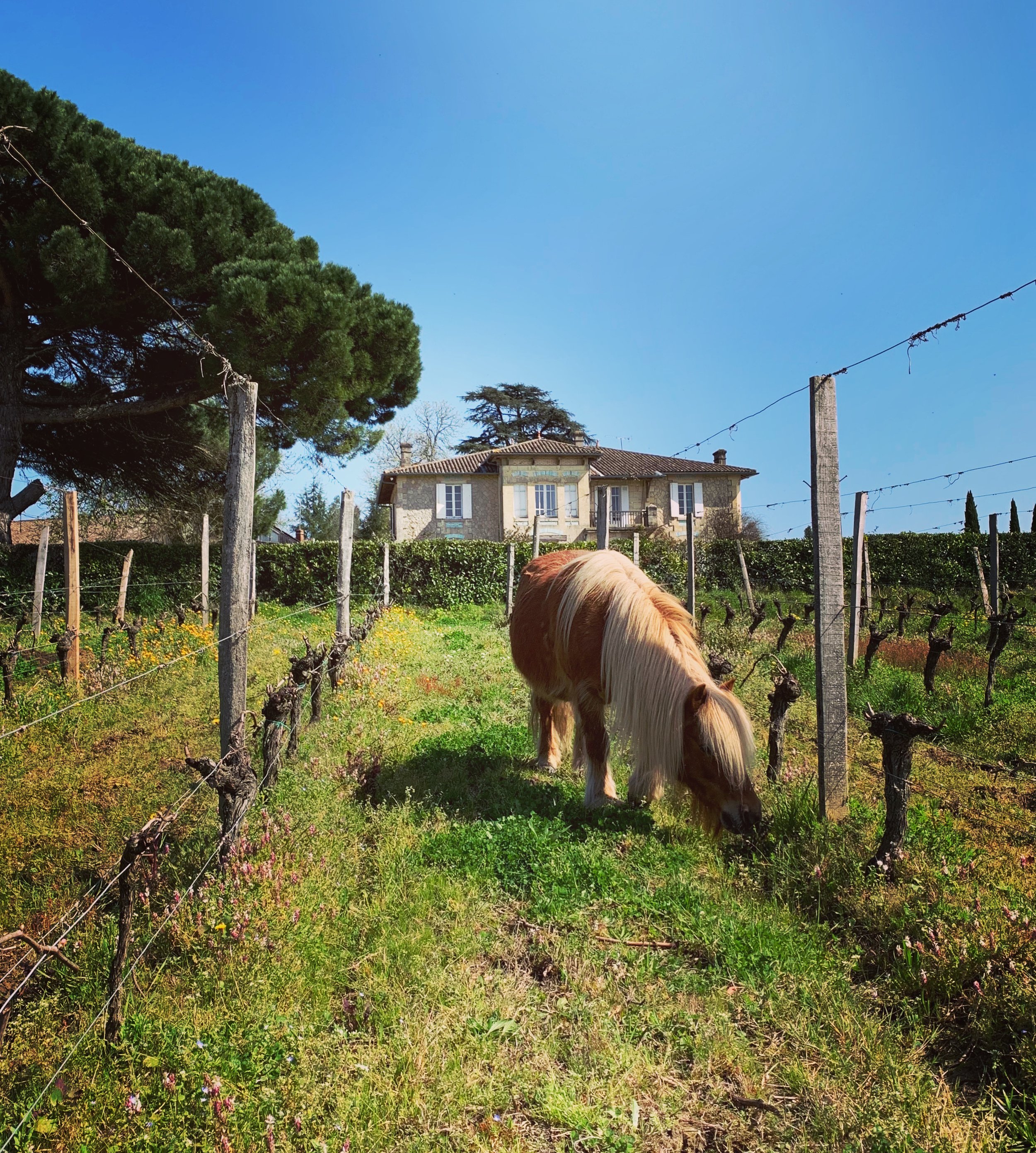Commitment to the environment
Sustainable practices
At Carsin, we are dedicated to crafting exceptional wines while prioritising environmental sustainability. Our commitment extends from the vineyards to the bottle and beyond, ensuring that every aspect of our winemaking process aligns with ecological principles. Read more about our viticulture practices, winemaking processes and responsable sales.
Organic farming
We embrace organic farming methods to cultivate our vineyards. We started organic farming in 2003, and since 2016 all of our vineyards, fruit trees and vegetables are purely organic. In the vineyard, organic farming includes the use of natural fertilizers and our own compost. Naturally, we don’t use synthetic sprays or herbicides of any kind, we work the soils manually. In the wintertime our farm animals are kept on the vineyards and they economise some mowing and tractor hours by weeding naturally (and of course fertilising at the same time).
Promotion of biodiversity
We use either natural or sowed cover crops between the rows of our vineyards to increase soil organic carbon (SOC), improve water infiltration and reduce erosion and greenhouse gases emission to the atmosphere. The promotion of biodiversity creates a balanced and more resilient ecosystem. We have also planted green fences around our parcels to better protect our plants and soils from neighbours who might not be organic. This also creates natural habitat for small animals, insects and birds. On top of vineyards, we cultivate fruits and vegetables and we have about 4 hectares of forest.
Water Conservation
We don’t irrigate vineyards and in our veggie garden we prioritise water conservation through efficient irrigation systems and soil management practices, ensuring optimal water usage while safeguarding the health of our vegetables. We collect a little bit of rain water, but it’s not enough yet. Our aim is to build a bigger water station to collect all of the rainwater for irrigation, washing tractors, picking baskets etc.
Soil Health
Maintaining soil health is paramount to sustainable viticulture. We employ techniques such as cover cropping, composting, and minimal tillage to enhance soil fertility and structure. The cover crops also prevent erosion which can be a problem on our hillsides with the rich clay soils.
Eco-friendly winemaking processes
Minimal Intervention
Our winemaking philosophy revolves around minimal intervention, allowing the grapes to express their unique characteristics. We avoid unnecessary additives and interventions, letting nature guide the winemaking process. We value handpicking and we prefer natural fermentations with indigenous yeasts instead of commercial yeast strains. Most of our wines are not fined nor filtered and all of our production is vegan friendly (no animal-based products are used in the winemaking process).
Eco-packaging with light bottles
We are dedicated to reducing our environmental impact through eco-friendly packaging solutions. Our commitment includes the use of lightweight packaging to minimise transportation emissions. Since 2019 we have changed to lighter bottles, at first from 550 grams to 450 grams and then onwards to 405 grams in 2021. This weight reduction has resulted in approximately 15 tonnes of annual savings in CO2 emissions (including the transportation). To put it into perspective, 15 tonnes of CO2 emissions is equal to traveling to and from Paris and New York, 15 times.
Reduction of waste and recycling
We’re committed to reduction of waste by recycling as much as possible. All green waste at the farm goes to the compost and eventually back to the vineyards or vegetable garden. All bottles, plastics, cardboards etc. are carefully recycled and our entire team is very committed to this. In the vineyards, we don’t use plastic clips or ribbons, everything is biodegradable. We only buy used palettes, barrels and other material whenever possible.
One of the winery’s biggest waste products is grape marc, stems and lees. All these are delivered to the local distillery (8 km away) who would then turn them into alcohol. In this way the grapes are used to the fullest and nothing is wasted.
Responsible Sales
Ethical Marketing Practices
Carsin adheres to ethical marketing practices, promoting our wines responsibly and transparently. We believe in providing consumers with accurate information about our sustainable practices and certifications.
Collaborations with Eco-Conscious Partners & promoting local sales
In our distribution and retail partnerships, we prioritise working with like-minded organisations that share our commitment to sustainability. This ensures that our wines reach consumers through channels that align with our values. In France, we work with several organisations or associations to promote local sales and “from farm to table” -ideology. These include for example: Bienvenue à la Ferme and La Ruche qui dit oui.
Certifications and Awards
Carsin proudly holds certifications and has received awards recognizing our dedication to sustainable practices. These include:
The certification by Ecocert for organic farming, Agriculture Biologique, since 2022.
Top 100 Trophées Bordeaux Vignobles Engagés in 2022 and 2023. We are one of the top wineries making effort in sustainable and responsible production in Bordeaux.
Bienvenue à la Ferme certification, the leader in short circuits and on-farm hospitality, Carsin is a member since 2023.
SWR - since 2023, Carsin is a member of Sustainable Wine Roundtable.
Continuous Improvement
We view sustainability as a journey of continuous improvement. We actively seek innovative solutions and stay informed about the latest advancements in sustainable viticulture and winemaking.
Thank you for choosing Chateau Carsin wines. By enjoying our products, you are not only savouring the rich flavours of our vineyards but also supporting a winery deeply committed to environmental responsibility. We invite you to join us on this journey towards a greener, more sustainable future.





